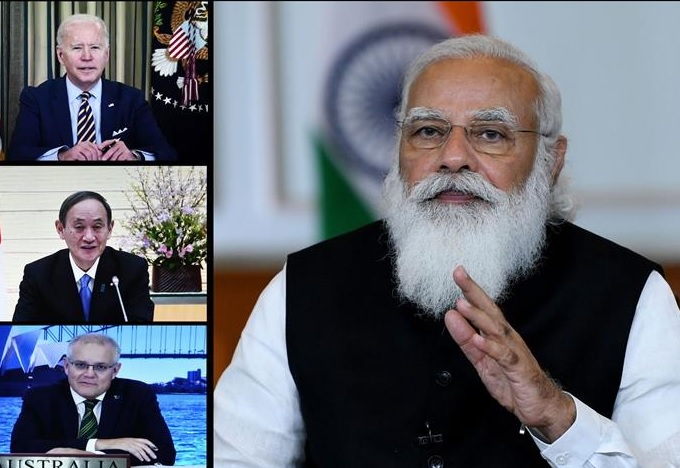

At the heart of Quad’s transition to a “force for the good” as Prime Minster Modi said in his inaugural remarks, is a vaccine alliance that will provide the globe with ample quantities of shots to counter the highly disruptive coronavirus pandemic, which has derailed the world from its political, economic and cultural moorings, and claimed millions of lives
<p>
<strong>The first meeting of Quad leaders&mdash;Prime Minister Narendra Modi, US President Joe Biden, Australian Premier Scott Morrison and Japanese Prime Minister Yoshihide Suga has underplayed its military orientation and nailed its role as an agency for peace and development in the Indo-Pacific.</strong></p>
<p>
At the heart of Quad&rsquo;s transition to a &ldquo;force for the good&rdquo; as Prime Minster Modi said in his inaugural remarks, is a vaccine alliance that will provide the globe with ample quantities of shots to counter the highly disruptive coronavirus pandemic, which has derailed the world from its political, economic and cultural moorings, and claimed millions of lives.</p>
<p>
After the meeting, Foreign Secretary Harsh Vardhan Shringla stressed that &quot;this (the meeting) is a special initiative which is designed proactively to mitigate the impact of Covid-19 among countries in the Indo-Pacific.&quot;</p>
<p>
Discussions in the conclave made it plain that India was now set to expand its role as a global manufacturing hub of vaccines.</p>
<p>
<iframe allow="accelerometer; autoplay; clipboard-write; encrypted-media; gyroscope; picture-in-picture" allowfullscreen="" frameborder="0" height="315" src="https://www.youtube.com/embed/SHyFrV1ezZ0" width="560"></iframe></p>
<p>
Confirming India&rsquo;s position on the global health map, US national security adviser Jake Sullivan told reporters in the Washington that the first major pledge out of the summit covered vaccines. Sullivan said Quad leaders &quot;made a massive joint commitment today: with Indian manufacturing, U.S. technology, Japanese and American financing, and Australian logistics capability, the Quad committed to delivering up to 1 billion doses to ASEAN, the Indo-Pacific and beyond by the end of 2022.&quot;</p>
<p>
The U.S. Development Finance Corporation, will help Indian drug manufacturer Biological E surge its capacity for Covid-19 vaccine production to at least 1 billion doses by the end of next year. In parallel the Japan International Cooperation Agency, is in talks to provide concessional yen loans to India to expand manufacturing of vaccines for exports.</p>
<p>
In his opening remarks, PM Modi that vaccines and climate change was on Quad leaders&rsquo; radar. &ldquo;We are united by our democratic values, and our commitment to a free, open and inclusive Indo-Pacific. Our agenda today – covering areas like vaccines, climate change and emerging technologies – makes the Quad a force for global good.&rdquo;</p>
<p>
<span style="color: rgb(255, 0, 0);"><strong>ALSO READ:</strong></span></p>
<p>
<a href="https://www.indianarrative.com/world-news/quad-leaders-joint-statement-modi-biden-morrison-and-suga-pledge-cooperation-on-urgent-global-challenges-73175.html"><strong>Quad Leaders&rsquo; Joint Statement: Modi, Biden, Morrison and Suga pledge cooperation on &#39;urgent&#39; global challenges</strong></a></p>
<div id="cke_pastebin">
<p>
<strong><a href="https://www.indianarrative.com/world-news/vaccine-partnership-to-climate-and-emerging-technology-working-groups-here-s-the-quad-summit-fact-sheet-73176.html">Vaccine partnership to climate and emerging technology working groups, here&#39;s the Quad Summit Fact Sheet</a></strong></p>
<div>
White House fact sheet later said that working groups will be set up on climate change and critical and emerging technologies.</div>
</div>
<p>
&ldquo;I see this positive vision as an extension of India&#39;s ancient philosophy of Vasudhaiva Kutumbakam, which regards the world as one family. We will work together, closer than ever before for advancing our shared values and promoting a secure, stable and prosperous Indo-Pacific,&rdquo; PM Modi observed.</p>
<p>
In a joint statement titled &quot;The Spirit of the Quad&quot; released after Friday&#39;s meeting, the leaders pledged to &quot;strengthen our cooperation on the defining challenges of our time&quot; but did not directly mention China. The closest they came was speaking of &quot;challenges to the rules-based maritime order in the East and South China Seas.&quot; They agreed to hold an in-person summit by the end of 2021.</p>
<p>
Notwithstanding the focus on vaccines, China&rsquo;s regional security threat did receive significant attention of the four interlocutors.&nbsp; Sullivan pointed out&nbsp; that the leaders did address &quot;key regional issues&quot; including freedom of navigation and freedom from coercion in the South and East China seas, the North Korean nuclear issue, and the coup and violent repression in Myanmar.</p>
<p>
Japan&rsquo;s Premier Suga also told Japanese media that he had expressed strong opposition to the unilateral Chinese effort to alter the status quo and that the four leaders had agreed to cooperate on the issue.</p>
<p>
&nbsp;</p>
India's toy industry, once heavily dependent on imports, is now manufacturing domestically and exporting to…
Members of the Indian diaspora and several artists in Argentina welcomed Prime Minister Narendra Modi…
Sub Lieutenant Astha Poonia officially became the first woman to be streamed into the fighter…
As Israel awaits Hamas's response on Friday to the latest proposal for a hostage release…
Deputy Chief of Army Staff (Capability Development and Sustenance), Lieutenant General Rahul R Singh, on…
A report on Bangladesh's media landscape has revealed that the restrictive laws and political press…